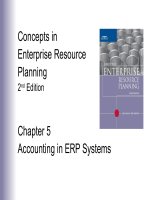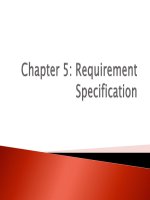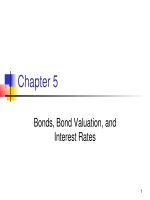Lecture Communication skill: Chapter 5 - Tracey Bretag, Joanna Crossman, Sarbari Bordia
Bạn đang xem bản rút gọn của tài liệu. Xem và tải ngay bản đầy đủ của tài liệu tại đây (346.15 KB, 85 trang )
Chapter 5
Improving your writing:
grammar and
self-editing
Copyright 2009 McGraw-Hill Australia Pty Ltd
PPTs t/a Communication Skills, by Bretag, Crossman and Bordia
1
5-1
Learning objectives
On completion of this chapter students will
know how to:
• identify ways to improve writing
independently
• develop a strategic approach to editing
written work
• understand the basic features of specific
grammatical constructions.
Copyright 2009 McGraw-Hill Australia Pty Ltd
PPTs t/a Communication Skills, by Bretag, Crossman and Bordia
2
5-2
Grammatical constructions
addressed in this chapter
•
•
•
•
•
•
•
•
•
•
Subject/verb agreement
Parallel construction
Verb tense
Article use
The apostrophe
Word form
Passive tenses
Gerunds and infinitives
So, neither and nor
Still and yet
Copyright 2009 McGraw-Hill Australia Pty Ltd
PPTs t/a Communication Skills, by Bretag, Crossman and Bordia
3
5-3
Be proactive about learning
how to write well
• Students who adopt an independent and
proactive approach to their language
development are likely to make better
progress than those who simply hope the
problem of language will disappear.
Copyright 2009 McGraw-Hill Australia Pty Ltd
PPTs t/a Communication Skills, by Bretag, Crossman and Bordia
4
5-4
How can you improve your
English language skills?
• Investigate any language support services
your university offers, whether as workshops or
online. In some universities you can make
appointments with trained staff to discuss your
written work.
• Invest some money in a self-study grammar
book with answers. Ask university staff for
advice on useful texts.
• Approach your university librarian for
suggestions on how they can help you to
improve your language and the resources and
services they offer.
Copyright 2009 McGraw-Hill Australia Pty Ltd
PPTs t/a Communication Skills, by Bretag, Crossman and Bordia
5
5-5
Activity 1
• Write down the resources available in your
university that can help you to improve your
English language.
• Discuss the options you have tried and
recommend some to other students.
Copyright 2009 McGraw-Hill Australia Pty Ltd
PPTs t/a Communication Skills, by Bretag, Crossman and Bordia
6
5-6
Common grammatical
errors
• Errors are easy to overlook, particularly
when working within tight deadlines.
• Not all errors are detected by computer
grammar checkers so edit your work after
you have used the software.
Remember: Poor grammar may change
your meaning or make your ideas difficult to
understand.
Copyright 2009 McGraw-Hill Australia Pty Ltd
PPTs t/a Communication Skills, by Bretag, Crossman and Bordia
7
5-7
Sentence structure
• There are two kinds of common error in
writing sentences:
– incomplete sentences
– ‘run-on’ (or run-together) sentences.
Copyright 2009 McGraw-Hill Australia Pty Ltd
PPTs t/a Communication Skills, by Bretag, Crossman and Bordia
8
5-8
Complete sentences
A complete sentence must contain a subject and a
predicate. (The rest of the sentence must contain a
verb.)
Example
Our business partners will arrive tomorrow
Subject
Predicate
The verb
Copyright 2009 McGraw-Hill Australia Pty Ltd
PPTs t/a Communication Skills, by Bretag, Crossman and Bordia
9
5-9
Complete sentences (cont.)
• In formal writing you must use complete
sentences.
• A group of words without a subject or
predicate is NOT a sentence. For example:
– And arrived later.
No subject
– He feeling very happy. Incomplete verb
Copyright 2009 McGraw-Hill Australia Pty Ltd
PPTs t/a Communication Skills, by Bretag, Crossman and Bordia
10
5-10
Activity 2
• Complete Activity 2 on p. 96 of your
textbook.
Copyright 2009 McGraw-Hill Australia Pty Ltd
PPTs t/a Communication Skills, by Bretag, Crossman and Bordia
11
5-11
Complete sentences (cont.)
• A complete sentence is also called an
independent clause.
• A clause may be independent (able to stand
alone—a sentence) or dependent (cannot
stand alone—is not a complete sentence).
• A clause is a group of words with a subject
and a verb.
Copyright 2009 McGraw-Hill Australia Pty Ltd
PPTs t/a Communication Skills, by Bretag, Crossman and Bordia
12
5-12
Run-on sentences
• If two independent clauses are written
together with
– no punctuation
– merely a comma
– no joining word
they are called a run-on sentence.
Examples
– He is a good manager all the staff like him
– He is a good manager, all the staff like him
(Both are run-on sentences and therefore
incorrect.)
Copyright 2009 McGraw-Hill Australia Pty Ltd
PPTs t/a Communication Skills, by Bretag, Crossman and Bordia
13
5-13
Using conjunctions to fix
run-on sentences
1. Using coordinating conjunctions:
– with a comma and one of the following words:
for, and, nor, but, or, yet, so.
Example
– He is a good manager, and all the staff like him.
Copyright 2009 McGraw-Hill Australia Pty Ltd
PPTs t/a Communication Skills, by Bretag, Crossman and Bordia
14
5-14
Using conjunctions to fix
run-on sentences (cont.)
2. Using correlative conjunctions:
– use: both…and, not only…but also, either…or
Example
– Not only is he a good manager but also all the
staff like him.
Copyright 2009 McGraw-Hill Australia Pty Ltd
PPTs t/a Communication Skills, by Bretag, Crossman and Bordia
15
5-15
Using conjunctions to fix
run-on sentences (cont.)
3. Using a semicolon (;) and a conjunctive
adverb plus a comma (,):
– common conjunctive adverbs: finally, then,
consequently
Example
– He is a good manager; consequently, all the
staff like him.
Copyright 2009 McGraw-Hill Australia Pty Ltd
PPTs t/a Communication Skills, by Bretag, Crossman and Bordia
16
5-16
Using conjunctions to fix
run-on sentences (cont.)
4. Using a subordinating conjunction:
– one sentence is less important than the other
Example
– All the staff like her because she is a good
manager.
Copyright 2009 McGraw-Hill Australia Pty Ltd
PPTs t/a Communication Skills, by Bretag, Crossman and Bordia
17
5-17
Using conjunctions to fix
run-on sentences (cont.)
5. Join the sentences with a relative
pronoun such as who, which or that:
– He is a good manager he initiated new
business practices. (Run-on sentence)
– He is a good manager who initiated new
business practices. (Correct sentence)
Copyright 2009 McGraw-Hill Australia Pty Ltd
PPTs t/a Communication Skills, by Bretag, Crossman and Bordia
18
5-18
Activity 3
• Complete activity 3 on pp. 97–98 of your
textbook.
Copyright 2009 McGraw-Hill Australia Pty Ltd
PPTs t/a Communication Skills, by Bretag, Crossman and Bordia
19
5-19
Subject/verb agreement
• A singular subject must have a singular
verb.
• Plural subjects must have a plural verb.
Copyright 2009 McGraw-Hill Australia Pty Ltd
PPTs t/a Communication Skills, by Bretag, Crossman and Bordia
20
5-20
Subject/verb agreement
(cont.)
Example
Susan and Anna are excellent colleagues.
The verb ‘to be’ must
be plural too.
Susan and Anna are two people
so the subjects are plural.
Copyright 2009 McGraw-Hill Australia Pty Ltd
PPTs t/a Communication Skills, by Bretag, Crossman and Bordia
21
5-21
Subject/verb agreement
(cont.)
Example
The verb ‘to be’ must take
the singular form ‘is’.
The university is quite new compared to others
in the state.
The university is a
singular subject
Copyright 2009 McGraw-Hill Australia Pty Ltd
PPTs t/a Communication Skills, by Bretag, Crossman and Bordia
22
5-22
Singular words take
singular verbs
• ‘one’ words: anyone, someone, everyone,
one, no one
• ‘body’ words: anybody, everybody,
somebody
• ‘thing’ words: anything, everything,
something, nothing
• each, either, neither
Copyright 2009 McGraw-Hill Australia Pty Ltd
PPTs t/a Communication Skills, by Bretag, Crossman and Bordia
23
5-23
Singular words take
singular verbs (cont.)
• Examples
–
–
–
–
Someone needs to oversee the changes.
Everybody is happy with the changes.
Everything has been agreed.
Each manager has granted approval.
Copyright 2009 McGraw-Hill Australia Pty Ltd
PPTs t/a Communication Skills, by Bretag, Crossman and Bordia
24
5-24
Other singular subjects
Uncountable nouns
A single gerund or
gerund phrase
The rice is steamed.
Understanding the
problem is difficult for
him.
An amount of time,
money or weight; plural
forms are considered as
single concepts
Six months is not a long
time to write a proposal.
Five thousand dollars is
a lot of money.
More than five kilos
costs more.
Copyright 2009 McGraw-Hill Australia Pty Ltd
PPTs t/a Communication Skills, by Bretag, Crossman and Bordia
25
5-25









